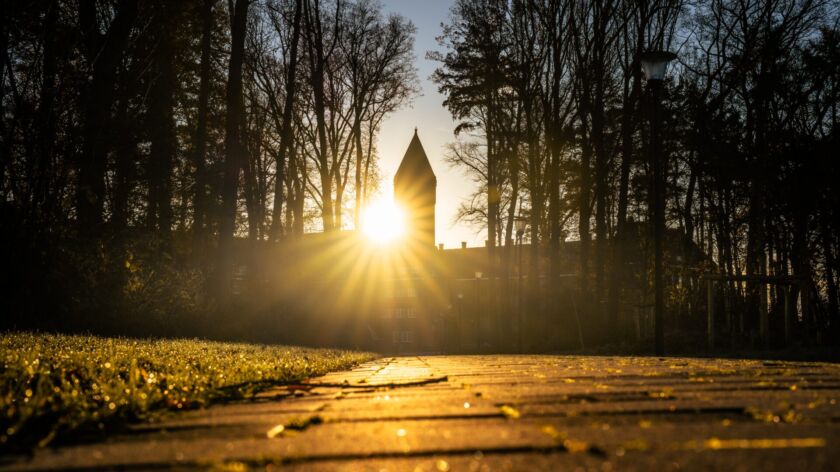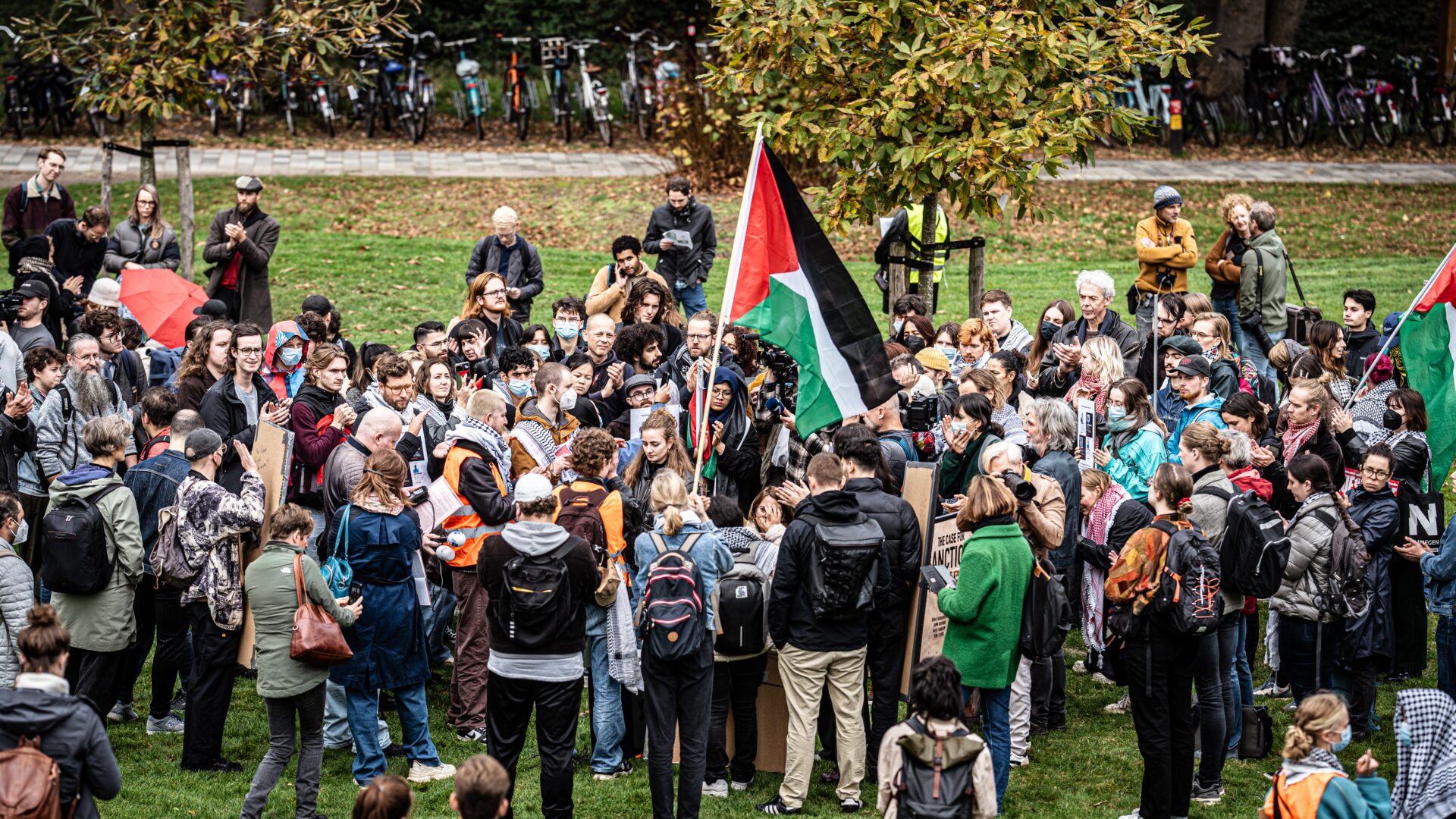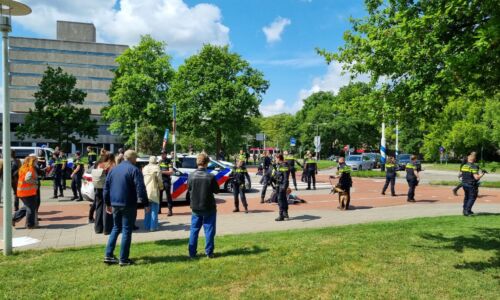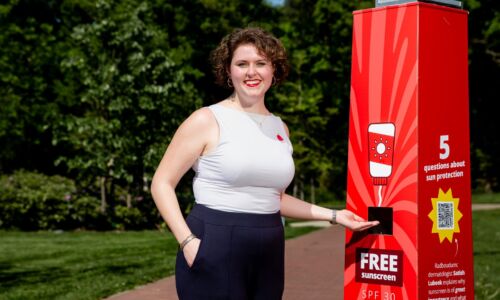Jewish and Israeli students and staff to Executive Board: “Take measures to ensure our safety”
-
 Het Berchmanianum. Foto: Johannes Fiebig
Het Berchmanianum. Foto: Johannes Fiebig
A group of Jewish and Israeli students and staff claim they do not feel safe on campus. They propose seven measures. The board is aware of the situation but also says that intervention is not a simple matter.
Immediately report any form of antisemitism, establish policies on whether or not to invite controversial speakers and enforce the ban on face coverings in campus buildings.
These are three of the seven measures being proposed by a group of Israeli and Jewish students and staff, who claim they do not feel safe on campus, urging the Executive Board of Radboud University to take action.
‘We cannot stand by and pretend nothing is going on’
“Since 7 October 2023, there has been growing unrest at Dutch universities,” reads the document they have posted online and sent to journalists. Radboud University, the site of many pro-Palestinian demonstrations last year, is no exception, according to the group. They say that Jewish and Israeli students and staff in particular experience feelings of insecurity, intimidation and social exclusion and have even received threats.
The document includes several short quotes, anonymised for security reasons, from Jewish or Israeli students and staff to illustrate these sentiments. For example, one person says they are afraid to speak Hebrew on campus and a staff member is considering leaving the university because of the unrest. A student who engaged in conversation with a pro-Palestinian demonstrator also testified to being treated in an intimidating manner.
Mohammed Khatib
The group consists of 13 people who wish to remain anonymous for security reasons, said Public Administration student Milos Boksan, acting as spokesperson. Boksan himself is not Israeli or Jewish, but he knows several students and staff who are. ‘We can’t stand by and pretend nothing is going on.’
Over the past year, the group has had several meetings with the Executive Board to share their concerns, Boksan says. The latest meeting happened shortly after the commotion surrounding Mohammed Khatib, the controversial activist who was supposed to visit the campus in October. The cabinet banned Khatib’s arrival, after which he gave a short statement via a livestream.

‘We appreciate that the board is willing to engage with us and listen to us, but nothing has changed for students and staff’, says Boksan. ‘We are therefore seeking publicity with this plan.’
A spokesperson for the university says that the Executive Board is aware of the international tension that permeates the campus and is leading to feelings of insecurity. ‘The university aims to provide a safe environment in which people treat each other with respect and offers room for emotions. The university does not consider racism, discrimination and calls for hatred and violence acceptable.’
Face coverings
One of the measures proposed by the group is to enforce the ban on face coverings in campus buildings. “Don’t get us wrong, we absolutely do not oppose the right to demonstrate,” says Boksan. “As far as we are concerned, activists can certainly demonstrate outside. That’s a right that we need to protect. However, I feel that the government should consider implementing a clearly defined ban on people wearing face coverings at these demonstrations.”
In fact, last September, a majority in the House of Representatives called for a total ban on face coverings at demonstrations. However, that is not possible, Justice and Security Minister David van Weel wrote in early January in a letter to the House of Representatives.
However, Boksan remembers several occasions when pro-Palestinian demonstrators also demonstrated in Radboud University buildings wearing face coverings, for example at a protest in the Refter or during a university open day. That is banned in educational institutions accredited by the government since the burka ban came into effect on 1 August 2019. ‘The security guards didn’t do anything. The Executive Board has confirmed to us that this is not allowed, yet they do not enforce the rule.’
‘Basically, if someone wears a face mask, that person does not have to give a reason for it’
This is true, and there is a reason for it, says the university spokesperson. He said most of the protesters in the Refter and at the master open day wore a face mask, which is allowed. ‘Basically, if someone wears a face mask, that person does not have to give a reason for it.’
Moreover, university security guards cannot always intervene. ‘In the interest of everyone’s safety, all interests must be weighed against each other in each situation. University security guards may address people. Enforcement in the sense of the law is a job for the police’, says the spokesperson.
Student intifada
The group also wants the university to report protesters if they are guilty of antisemitism. According to Boksan, this is the case when they call for a student intifada, for example, or when they chant the slogan ‘From the river to the sea, Palestine will be free’.
Pro-Palestinian demonstrators see that differently. ‘We don’t mean that we want to expel all Israelis from their country’, two of them previously told Vox. ‘What we want is for there to be one Palestine in which everyone can live, regardless of faith and origin.’
‘This is just a call to wipe Israel off the map’
Boksan: ‘This is just a call to wipe Israel off the map. Moreover, Education Minister Eppo Bruins has previously called on universities to report cases of antisemitism. We hope that Radboud University will heed that.’
The Executive Board also disapproves of the use of the slogan in this context, says the university spokesperson. ‘It is well known that the slogan can be perceived as extremely hurtful, making it difficult to embark on a good conversation.’
Again, intervention is complicated. The controversial slogan falls under freedom of expression, and it is not an offence to use it, according to an Amsterdam court ruling. The university does report offences such as vandalising university buildings, the spokesperson said. ‘Students and staff can also report that themselves. A university confidential advisor can help them with that.’
Visible action
The group also hopes the university will take better action against staff who contribute to feelings of insecurity. According to the document, staff have been known to spread propaganda from terrorist organisations, for example. A footnote gives the example of a lecturer who shared a statement from the militant group Hezbollah (whose military wing is among the terrorist organisations listed in the government’s database) on X.
What does the group expect from the university? ‘That’s a tricky question, because as a student, you have to be somewhat reserved in your attitude towards staff’, says Boksan. ‘What concerns us, however, is that students sometimes no longer want to come to campus because of such expressions.’
‘So what should the Executive Board do? Take visible action’
If statements made by a staff member do not reflect the university’s code of conduct or the social media regulation, then their supervisor is expected to talk to them about it, says the university spokesperson. He would not respond to questions about individual staff members.
The group believes that the Executive Board cannot continue to pass this off to supervisors or department heads. ‘In that case, nothing happens. So what should the Executive Board do? Take visible action. How? That’s up to them.’
The Executive Board said it would invite the initiators to a meeting to discuss their seven proposals for a more dignified campus. Boksan was rather disappointed by that response. ‘We are happy to meet them, but something needs to change too.’



